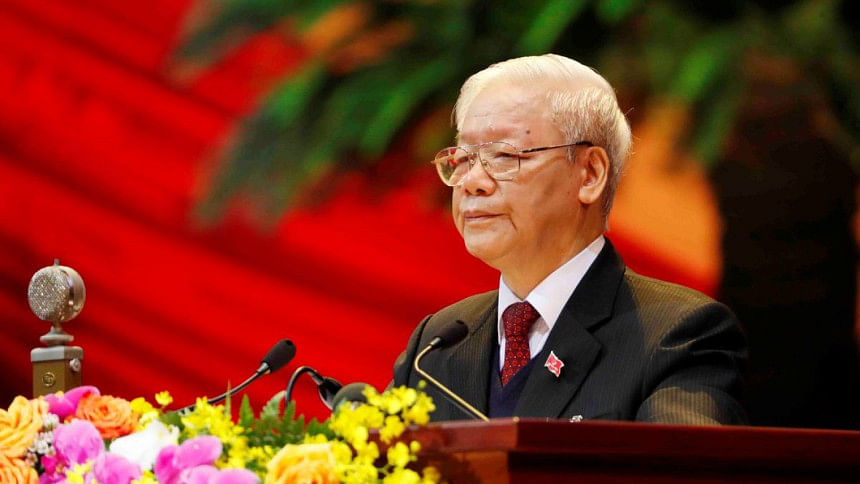‘Global crises expose capitalism’s innate contradictions’

The recent crises triggered by economic collapse and the Covid-19 pandemic have shown the world the "innate and fundamental contradictions" of capitalism, said Professor Dr Nguyen Phu Trong, general secretary of the Central Committee of the Communist Party of Viet Nam (CPV).
On the occasion of the 131st birthday of President Ho Chi Minh and the elections of deputies to the 15th National Assembly and all-level People's Councils 2021-2026, Dr Trong on Thursday outlined his party's goals in an article titled "A number of theoretical and practical issues on socialism and the path towards socialism in Vietnam".
Anchoring his party with Marxism-Leninism and Ho Chi Minh Thoughts, Dr Trong said Vietnam needs to "selectively" incorporate the latest ideological and scientific achievements to its socialistic principles to advance in a fast-moving, increasingly more integrated world.
Defending socialism, which has seen steep decline and challenges since the fall of the Soviet Union in the 1990s, he pointed out capitalism's shortfalls.
Acknowledging the immense accomplishments of capitalism -- which remains relevant and even growing through continuous adaptation and incorporation of new ideas, especially in liberating and developing the productive capacity and advancing science and technology -- he pointed to the social protest movements that broke out in many developed capitalist countries in recent times.
He said the "freedom and democracy" that the West spares no effort to promote and impose upon the world at large does not at all guarantee that power shall truly be of the people, by the people and for the people – which is what democracy means at its core.
Dr Tong said the system of power belongs mainly to the wealthy few and serves the interest of large capitalist cartels, which, he thinks, is behind the global "99% versus 1%" movement. In political life, once the power of money dominates, the power of the people shall be overpowered, he added.
"This is why in developed capitalist countries, 'free' and 'democratic' elections, as they claim, may change governments, but may not change the ruling power. Behind the multi-party system in fact remains the dictatorship of capitalist cartels."
He blamed the existential crises -- economic, financial, energy and environmental -- that humanity are facing on the process of capitalist economic and social development that crowned consumption of material and profit as its supreme end.
Moreover, noting "bad development" and "anti-development" paradoxes, he said the ground reality has shown us that the "free market" of capitalism itself cannot help solve these problems.
On the contrary, a socialist society is one that strives toward progressive and humanistic values, based on the harmony between the common interests of the entire society and legitimate interests of the people, he said.
"Democracy is the nature of the socialist regime. It is both the goal and engine for the construction of socialism. Building a socialist democracy that ensures the real power belongs to the people is an ultimate and long-term mandate of Vietnam's revolution," he said.
Dr Trong hailed the enviable development of the country defying various challenges and adversaries since the 1986 "Doi Moi" reform, which aims at developing a socialist-oriented market economy.
Since the reform, Vietnam's per-capita income has increased 17-fold to $3,512. The country's economy is now growing at seven percent on an average with industries contributing 85 percent of the GDP. It has achieved food security and become a leading exporter of rice and various other agricultural products. In 2020, Vietnam's foreign exchange reserves jumped to $100 billion. Its foreign direct investment is also expanding.
Thanks to the economic development, Vietnam has a 95 percent literacy rate. At least 70 percent of the population now has internet access and Vietnam is among the world's fastest-developing IT countries.
Dr Trong has urged the citizens to remain steadfast and firm on the foundation of Marxism-Leninism to combat corruption, moral degradation and qualitative development.
He said combining economy with society, economic policies with social policies, and economic growth with social progress and justice may gain the desired outcome.
He also emphasised on the importance of global integration "on the basis of respect for the independence, sovereignty and territorial integrity of each other, non-interference in each other's internal affairs, equality and mutual benefit".

 For all latest news, follow The Daily Star's Google News channel.
For all latest news, follow The Daily Star's Google News channel. 



Comments